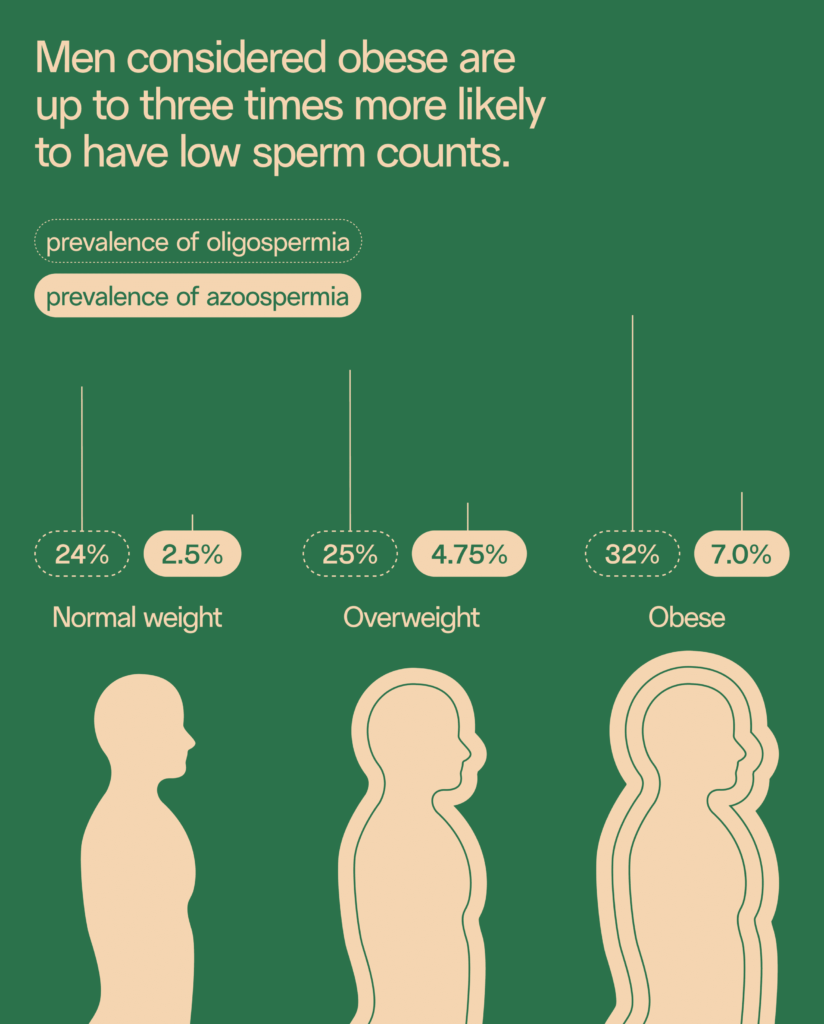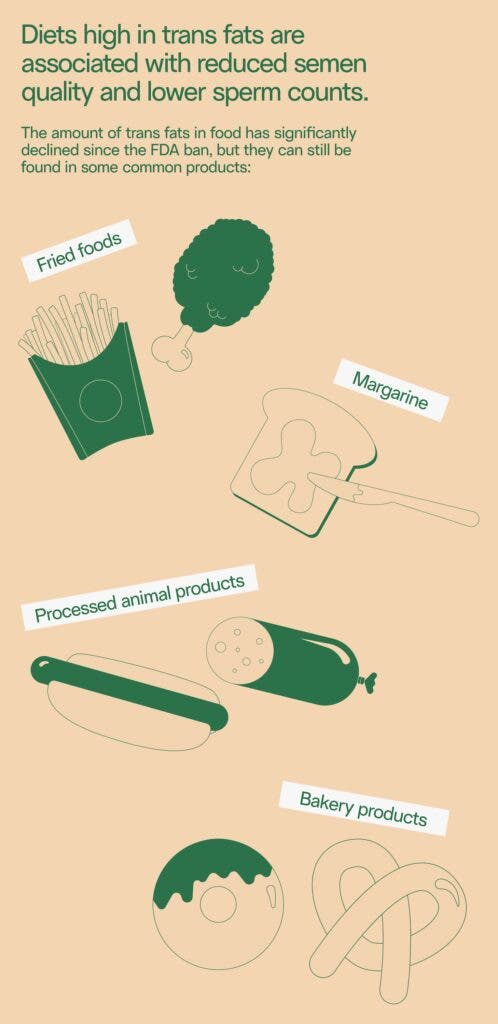Trying to conceive when living with obesity may be more challenging. However, the relationship between body weight and male fertility is complex, multifactorial, and not fully understood. Learn about the effect of body weight on male fertility, and what you can do to improve your chances of conception by incorporating healthy lifestyle changes into your daily routine.
Key takeaways
- Excess body weight is related to hormone imbalance, erectile dysfunction, systemic inflammation, poor sperm motility, and low semen quality.
- Research suggests obesity and diet may be major factors in the declining sperm quality and testosterone levels over the last 40 years.
- If you have excess body weight, evidence supports the advice that reducing body mass index through diet changes and weight loss can improve male fertility and sperm parameters.
- Being underweight can also negatively impact male fertility. Maintaining a body mass index (BMI) within the normal range can help fertility concerns.
A new trial published in the journal Human Reproduction found that when obese men who were trying to conceive lost weight by changing their diet, they saw a significant increase in sperm count and concentration.
Although much research has highlighted the negative impact of obesity on sperm quality, there has been a lack of evidence investigating the specific effects of short and long-term weight loss on sperm health parameters until now. Let’s explore the connection between body weight and male fertility.
What is normal body weight vs. overweight vs. obesity?
The simplest calculation for determining if body weight is “normal” is the body mass index (BMI). This calculation factors in both your height and weight to give you a general idea of whether your body weight is healthy.
Keep in mind that BMI isn’t the most accurate way to determine your overall health, and has some problems. For example, someone who is a bodybuilder and extremely muscular may erroneously be marked as overweight when using a BMI calculator, since muscle is actually denser and heavier than fat. Other methods of determining body fat are more precise, but require specialized equipment.
For most people, BMI can provide an easy, quick understanding of their body weight. For adults:
- A BMI of 18.5–24.9 is considered a healthy weight.
- A BMI of 25–29.9 is considered overweight.
- A BMI of 30 and above is considered obesity.
How does obesity affect male fertility?
A review of research into male fertility published in 2018 demonstrated a global drop in average sperm counts within industrialized countries. The decline is as much as 50–60% over the last four decades, in men without known fertility issues. Although this downward trend results from several factors, poor diet quality and increased obesity rates may be critical contributors.
Many studies have highlighted the impact of obesity on male fertility. Excess body weight is associated with:
- erectile dysfunction
- systemic inflammation
- poor sperm motility
- poor semen quality
- testosterone deficiency and other hormone imbalance

Specifically, studies have found that:
- Men considered obese are more likely — up to three times more likely — to have oligospermia, AKA low sperm count.
- In general, a higher body mass index (BMI) correlates with a lower total sperm count.
- In several studies, obesity has been linked to poor sperm motility (ability to swim), abnormal sperm morphology (size/shape/structure), and high levels of sperm DNA fragmentation (genetic damage).
- Other studies have shown that obesity and a sedentary lifestyle affect not only the structure of the sperm, but also the development of offspring and their health in later stages of life.
| Normal weight | Overweight | Obese | |
| Prevalence of oligospermia (low sperm count) | 24% | 25% | 32% |
| Prevalence of azoospermia (no sperm found in semen) | 2.5% | 4.75% | 7% |
Source: Sermondade et al, 2012.
Diet and male fertility
Poor diet may contribute to both overweight/obesity and poor sperm quality. For example, diets higher in trans fats (found in fried foods, margarine, and processed animal products) are associated with poorer semen quality and lower sperm counts. Added sugar has also been associated with negative impacts on male fertility, and can contribute to excess body weight.

Specific vitamins and minerals are essential for the production and development of sperm, a process known as spermatogenesis. Diets that lack the vital nutrients required for this process can negatively impact this process resulting in reduced male fertility.
Learn more about superfoods for male fertility.
How does obesity affect testosterone and other hormone levels?
Testosterone is a hormone that plays a vital role in sperm production and sex drive. Having low testosterone levels (also known as hypogonadism) may impact your fertility through reduced libido, sexual dysfunction, and reduced sperm production.
Testosterone is frequently low in obese men due to reductions in sex hormone binding globulin. Severe obesity can suppress the hypothalamic-pituitary-testicular (HPT) axis, which is a vital hormone process in male fertility.
However, the relationship between testosterone and body weight is complex. Low testosterone can also contribute to weight gain and lack of muscle mass, making it a “vicious spiral” for those with low testosterone and obesity.
A 2018 study shows that obesity not only affects sperm production but also negatively impacts overall sexual performance, causing increased rates of erectile dysfunction. It’s thought this results from low levels of androgens (including sex hormone-binding globulin-bound and testosterone) in obese men.
Diet and testosterone
What you choose to eat could reduce or increase your testosterone levels. A 2021 study showed that men who ate less inflammatory foods (lower in refined carbohydrates and saturated fats) had higher testosterone levels than those who consumed these pro-inflammatory foods.
The participants consuming the highest levels of these unhealthy options showed a 29.6% increased risk of testosterone deficiency compared to those with the least amount of these foods in their diet. Those who regularly consumed a pro-inflammatory diet had an increased risk of weight gain leading to obesity which research shows can impact male fertility.
Learn more about diet and testosterone.
Can losing weight increase sperm count or improve male fertility?
So, if carrying excess weight can negatively affect sperm health and hormone health, does it make a difference if you lose weight? Studies strongly suggest that losing weight can contribute to improved male fertility.
A new randomized controlled trial responded to calls for research into the effect of weight loss on fertility to see if the harmful effects of obesity can be mitigated by losing weight by changing eating patterns and exercise. Participants consumed a low-calorie diet, and researchers measured semen parameters before and after the 8-week intervention. The men lost an average of about 36 lbs on the low-calorie diet.
This weight loss came with an increase in sperm concentration of about 150%. Those who maintained the weight loss at a 1-year post-study review also maintained the sperm improvement — whereas those who regained the weight did not. This study also highlighted exercise as an important factor in maintaining initial weight loss, which linked to increased sperm quality in the long term.
This adds to previous research, which identifies diet changes that resulting in a 12% reduction in body weight can positively impact semen quality. Another small study found that a 16-week treadmill regimen improved both semen parameters and testosterone levels in obese men.
Does being underweight affect male fertility?
We’ve discussed the connection between obesity and male fertility problems, but what about the flip side? Can being underweight impact male fertility?
A 2019 study reviewed the evidence base investigating the effect of low BMI on male fertility. They looked at several parameters, including sperm count, concentration, motility, and volume. The findings indicated low BMI could also negatively affect male fertility regarding semen production and sperm quality.
It would appear that both extremes of the BMI scale can have adverse effects on male fertility.
| Underweight | Normal weight | |
| Prevalence of oligospermia (low sperm count) | 25.9% | 24.5% |
| Prevalence of azoospermia (no sperm found in semen) | 22.2% | 9.8% |
Source: Bienek et al, 2016.
Can changing your diet or lifestyle improve male fertility?
Achieving or maintaining a BMI within the normal range could be the first step to improving your fertility by increasing your sperm count. Besides avoiding highly processed carbohydrates and animal fats, what other changes can help improve sperm quality?
In general, diets that are antioxidant-rich and center on whole foods like fruits and vegetables and lean meats have been shown to be beneficial for male fertility.
Studies have shown that diets high in omega-3 fatty acids may lead to improved sperm quality, health, and motility compared to a diet high in saturated fats, processed carbohydrates, and red meat (which can result in reduced sperm quality across all parameters). It’s advisable to find healthy sources of omega-3 fatty acids, either in the form of supplements or through the consumption of white fish or flaxseed and nuts.
A Mediterranean-style diet may be the healthiest choice for improving sperm quality, possibly due to the high consumption of fruit and vegetables in this diet, which is associated with significant improvements in sperm concentration, total sperm count, and sperm motility.
The key aspects of a Mediterranean diet include:
- Eating whole foods like fruit and vegetables, whole grain bread, whole grain cereals, nuts, pulses, beans, and seeds
- Consuming healthy fats like olive oil and nuts
- Increasing your intake of oily fish
- Reducing saturated fat from dairy and red meat
- Reducing sugar consumption
In addition, research shows physically active men have improved sperm motility and morphology. Exercise positively affects sperm parameters, and regular, moderate exercise benefits your fertility. In the journal Reproduction, scientists found that completing at least thirty minutes of exercise three times a week could improve sperm count.
If you are having fertility problems, looking at your diet and lifestyle is an excellent place to start. Essential vitamins and minerals like selenium, zinc, and folate are necessary for the production and development of sperm. Try to make sure your diet includes these nutrients. You can also learn more about supplements for male fertility if you want to improve your sperm health.
Start with a semen analysis
Wondering where you stand in terms of male fertility? Start with an at-home semen analysis. This easy, affordable test will give you your baseline metrics for sperm count and quality, and help inform your next steps for improving your chances of conception.



